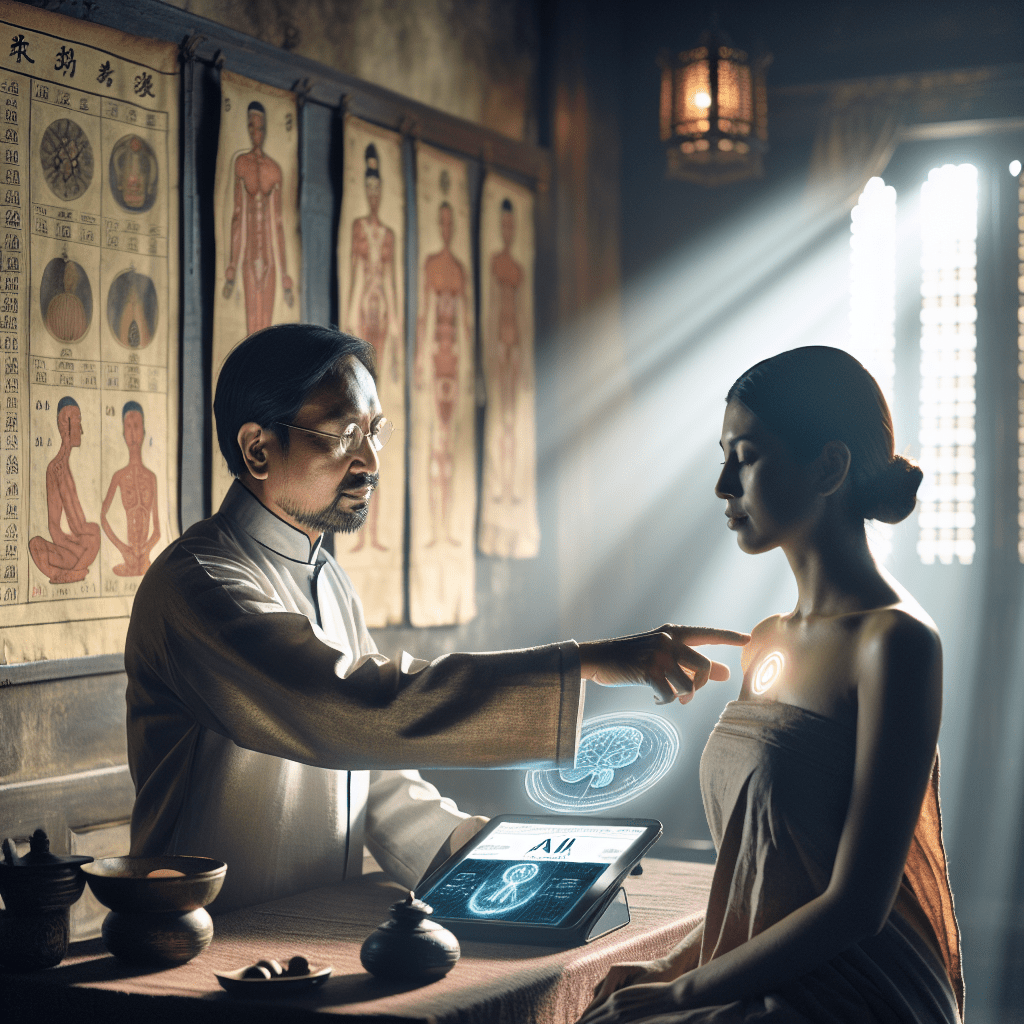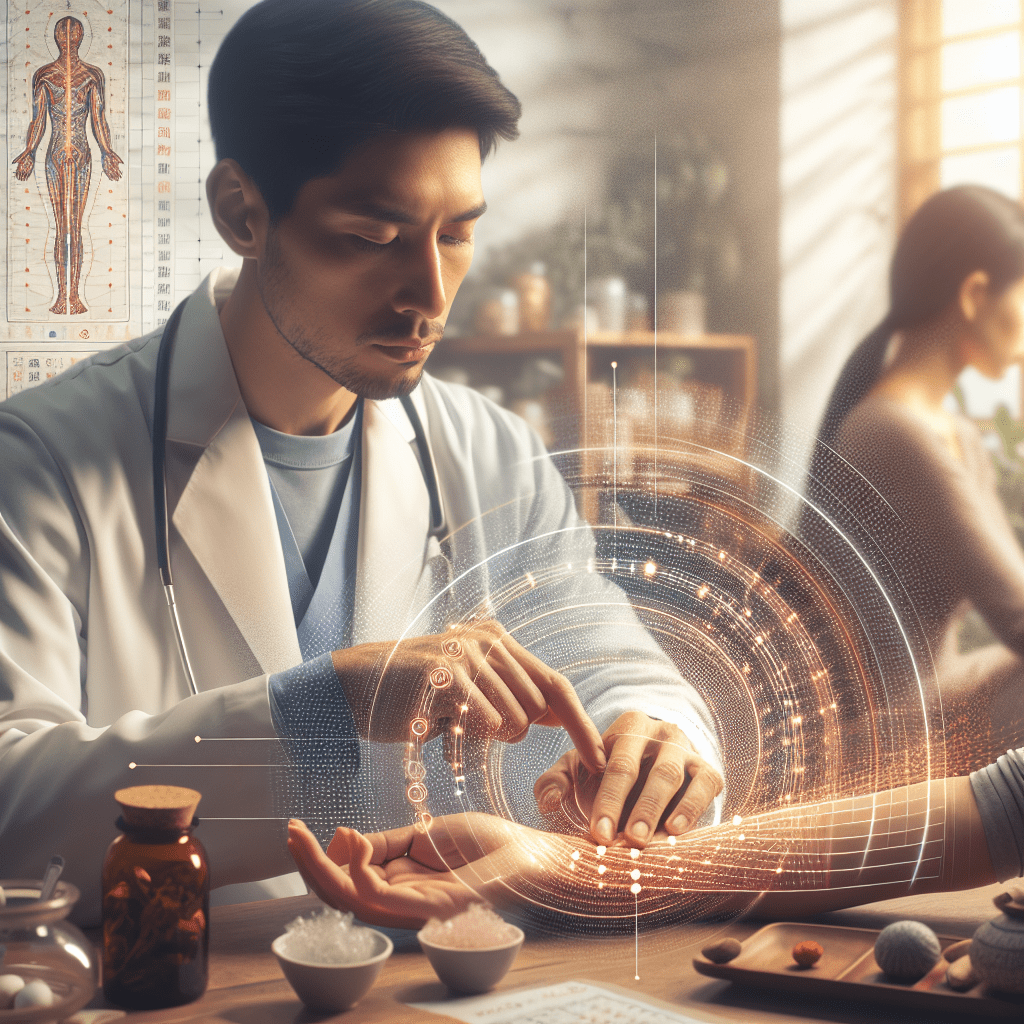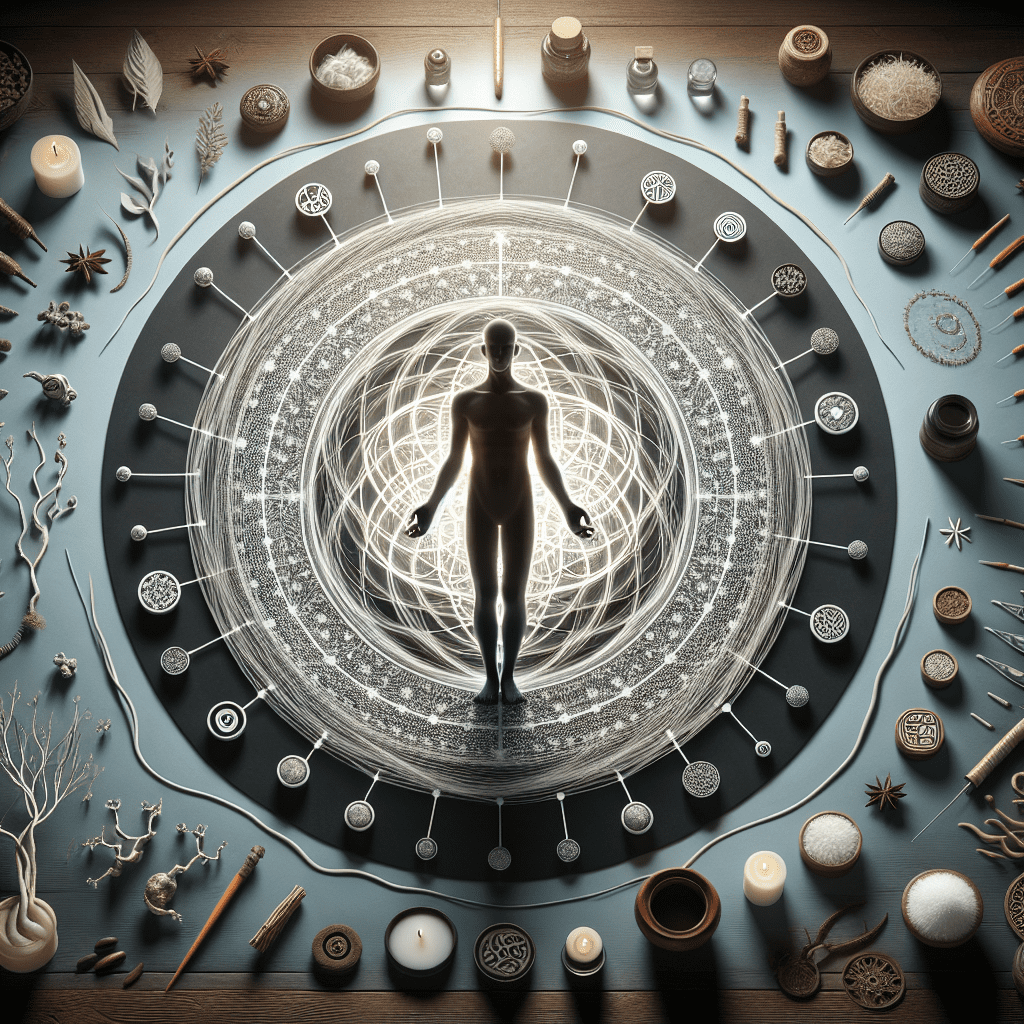In a world where healthcare constantly evolves, an unexpected partnership is blossoming. Ancient healing practices that have guided wellness for thousands of years are now joining forces with cutting-edge artificial intelligence. This fascinating intersection of Traditional Chinese Medicine (TCM) and AI represents more than just technological advancement—it’s a harmonious blend of time-tested wisdom and modern innovation that could revolutionize how we approach health and healing. This innovative pairing offers new pathways to wellness that honor both tradition and technology.
Traditional Chinese Medicine, with its 2,000-year history, has always viewed the human body as an interconnected system where balance is key to wellness. Meanwhile, artificial intelligence—the digital brain capable of analyzing vast amounts of data and identifying patterns invisible to human eyes—offers unprecedented analytical power. When these two worlds converge, something truly remarkable happens: ancient healing practices gain scientific validation, while technology gains the depth of holistic understanding.
This marriage of old and new isn’t just a curiosity—it’s potentially transformative for global healthcare. As we face increasing health challenges and seek more personalized approaches to wellness, AI in Traditional Chinese Medicine offers a bridge between conventional healthcare and time-honored healing traditions, creating a more comprehensive approach to our well-being journey.
Enhancing TCM Diagnostics with Artificial Intelligence
Traditional Chinese Medicine diagnostics has always relied on a practitioner’s expertise in reading subtle signs—from tongue appearance and pulse quality to facial color and body odors. These diagnostic methods, while incredibly sophisticated, depend heavily on the practitioner’s experience and interpretive skills. Enter artificial intelligence, which is now elevating these ancient diagnostic practices to new levels of precision. This intersection of ancient art and modern technology opens exciting new possibilities for healthcare.
Machine learning algorithms are being trained on thousands of patient records and diagnostic images, learning to identify patterns that correlate with specific health conditions according to TCM principles. For example, AI systems can now analyze digital tongue images—a fundamental diagnostic tool in TCM—identifying subtle colorations, coating textures, and shape variations that might escape even experienced practitioners. One recent study found that AI-assisted tongue diagnosis achieved an accuracy rate of over 85% in identifying certain constitutional imbalances, exceeding the consistency rates of human practitioners working independently.
“The integration of AI into TCM diagnostics isn’t about replacing traditional knowledge, but enhancing it,” explains Dr. Wei Chen, a researcher in medical AI applications. “Machine learning can process variables simultaneously in ways humans simply cannot, providing a level of objectivity and standardization that strengthens TCM’s diagnostic foundation.”
This technological boost addresses one of the biggest criticisms of Traditional Chinese Medicine—the perceived lack of standardization in diagnosis. By analyzing data from thousands of cases, AI helps establish more consistent diagnostic criteria while still honoring the individualized approach that makes TCM so effective. The result is a more reliable diagnostic process that builds bridges between Eastern and Western medical paradigms, potentially increasing acceptance of TCM approaches in conventional healthcare settings.
AI-Powered Herbal Screening: Unlocking Ancient Remedies with Modern Tools
The herbal pharmacy of Traditional Chinese Medicine contains thousands of natural substances, used in countless combinations to address specific health imbalances. This vast herbal knowledge, accumulated over centuries, represents one of humanity’s greatest medicinal treasures—but also presents significant challenges for modern research and application. AI’s role in understanding this vast pharmacopeia represents one of today’s most exciting medical frontiers.
Artificial intelligence is transforming how we understand and utilize this herbal wisdom. Advanced algorithms can now screen thousands of herbs and their compounds, identifying potential therapeutic properties based on molecular structures and historical usage patterns. This process, which might take human researchers decades to complete, can be accomplished by AI systems in mere months or even weeks.
“What’s particularly exciting is how AI can identify synergistic relationships between herbs,” notes botanical researcher Dr. Lin Zhao. “Traditional formulas often contain multiple herbs that work together in ways single-compound medications cannot. AI helps us understand these complex interactions at a molecular level.”
In one groundbreaking application, researchers used machine learning to analyze over 8,000 known compounds in common TCM herbs, identifying several that showed promising activity against inflammatory pathways not previously recognized in Western pharmacology. This kind of screening accelerates the discovery process exponentially, potentially bringing new natural therapeutic options to people faster than ever before.
Beyond identifying active compounds, AI helps optimize herbal formulations by predicting how different combinations might affect efficacy and safety based on both historical records and modern pharmacological knowledge. This fusion of ancient wisdom with computational power ensures that traditional formulations remain relevant and effective for contemporary health challenges.
Accelerating Drug Discovery Through AI and TCM Principles
The marriage of AI technology with TCM principles is revolutionizing drug discovery in ways previously unimaginable. Traditional drug development typically follows a linear, time-consuming path, often taking more than a decade and billions of dollars to bring a single medicine to market. By incorporating TCM’s holistic approach with AI’s predictive capabilities, researchers are finding shortcuts through this lengthy process. This technology-enhanced approach could dramatically reduce the time and resources needed to discover effective new treatments.
AI algorithms excel at predicting how molecules will interact with biological targets in the human body. When these algorithms are fed with data on traditional Chinese herbs—many of which have documented effects over thousands of years—they can rapidly identify promising compounds for modern drug development. This approach respects the wisdom of TCM while subjecting it to rigorous scientific verification.
“The beauty of combining AI with TCM in drug discovery is that we’re not starting from scratch,” explains pharmaceutical researcher Dr. Sarah Wong. “We’re beginning with substances that have already been used safely in humans for centuries. AI helps us understand why they work and how we might enhance their effectiveness.”
In a recent breakthrough, an AI system analyzed the molecular structure of compounds in a traditional formula used for cardiovascular health. The system identified a unique mechanism of action not previously recognized in Western medicine, leading to the development of a new class of heart medications currently in clinical trials. This discovery might never have happened without the algorithmic analysis of TCM’s ancient formulations.
By predicting molecular interactions and therapeutic potential, AI is helping bridge the gap between traditional herbal knowledge and modern pharmaceutical standards. This process respects the time-tested wisdom of TCM while enhancing it with contemporary scientific validation—a perfect example of how ancient healing arts and cutting-edge technology can work together for human benefit.
Personalized Treatment Plans: Where Eastern Wisdom Meets Data-Driven Precision
One of the most remarkable aspects of Traditional Chinese Medicine has always been its deeply personalized approach. TCM practitioners don’t just treat diseases—they treat individuals, considering each person’s unique constitution, environment, and life circumstances. This personalization, once dependent entirely on the practitioner’s skill, is now being enhanced through artificial intelligence’s ability to process complex, multidimensional data. Artificial intelligence now enhances this individualized approach in ways that honor tradition while embracing innovation.
AI systems can analyze thousands of variables simultaneously—from pulse readings and tongue diagnostics to lifestyle factors, genetic information, and environmental conditions. By identifying patterns within this data and comparing them to historical treatment outcomes, these systems can suggest highly individualized treatment protocols that honor TCM principles while incorporating contemporary health knowledge.
“What we’re seeing is truly unprecedented,” says TCM practitioner Dr. Zhang Wei. “AI doesn’t replace the human element in TCM—it amplifies it. The technology can suggest personalized herbal formulations, acupuncture points, and lifestyle modifications based on a more comprehensive analysis than any single practitioner could perform.”
A particularly promising application is in constitutional typing—a cornerstone of TCM that categorizes individuals according to their inherent tendencies and imbalances. AI systems trained on thousands of patient profiles can now identify constitutional types with remarkable accuracy, helping practitioners develop more precise treatment strategies. This approach mirrors the EASTCHI AI system developed by HerbalsZen, which analyzes users’ constitutional types through Five Element Theory to provide customized nutrition and lifestyle recommendations.
This integration of traditional wisdom with AI-driven analysis creates a powerful synergy where the whole truly becomes greater than the sum of its parts. Patients receive treatments that honor both their individuality and the collective wisdom of generations, all validated and refined through contemporary data analysis.
The Future Landscape: Revolutionary Potential for Healthcare
The collaboration between AI and Traditional Chinese Medicine stands at the threshold of transforming global healthcare in profound ways. As these technologies mature and integration deepens, we can anticipate several revolutionary developments that may reshape how we understand and address health and disease. The potential benefits extend from individual wellness to global public health systems.
First, we’re likely to see increased validation of traditional practices through objective data analysis. As AI systems process millions of treatment outcomes, patterns of efficacy will emerge that provide scientific substantiation for approaches once dismissed as merely anecdotal. This validation could dramatically increase acceptance of TCM methodologies in conventional healthcare settings.
Second, the development of hybrid treatment models that seamlessly blend Eastern and Western approaches will accelerate. “We’re moving toward a truly integrative healthcare paradigm,” predicts medical futurist Dr. James Chen. “One where AI helps identify which patients might benefit most from conventional treatments, which from traditional approaches, and which from carefully designed combinations of both.”
Third, preventative healthcare—always a strength of TCM—will gain new prominence as AI helps identify subtle imbalances before they manifest as disease. By analyzing minor variations in bodily functions against massive datasets, AI systems can detect health trends long before conventional testing would show abnormalities. This aligns perfectly with TCM’s focus on maintaining balance rather than just treating illness.
Perhaps most importantly, this technological revolution may help democratize access to health knowledge that was once available only through years of specialized study. AI-powered applications can guide individuals in making daily choices aligned with TCM wisdom, from seasonal eating patterns to appropriate exercise based on constitutional type—much like the seasonal dietary guidance provided by EASTCHI AI.
Embracing the Best of Both Worlds: The HerbalsZen Approach
As we stand at this exciting crossroads where ancient wisdom meets artificial intelligence, one thing becomes clear: the future of wellness lies not in choosing between traditional and modern approaches, but in thoughtfully integrating them. This philosophy of integration perfectly aligns with HerbalsZen’s mission of blending Eastern medical wisdom with cutting-edge technology. HerbalsZen stands at the forefront of this integration, embodying the principle that true healing draws from both ancient wisdom and modern innovation.
The EASTCHI AI system developed by HerbalsZen exemplifies this harmonious integration, analyzing individual health patterns through the lens of Five Element Theory while employing sophisticated algorithms to provide personalized recommendations. By embracing the concept of food as medicine—a cornerstone of Eastern healing traditions—and enhancing it with AI’s analytical capabilities, HerbalsZen offers a bridge between time-tested wisdom and modern technological advancement.
This convergence of AI and Traditional Chinese Medicine represents not just a technological evolution but a conceptual one—a recognition that true wellness comes from honoring both the accumulated wisdom of centuries and the innovative possibilities of today. As these two powerful approaches continue to enrich each other, we can look forward to a future where healthcare becomes more personalized, preventative, and holistic—where the best of ancient healing arts and modern science work together in service of human wellbeing.
In this exciting new landscape, the centuries-old wisdom of Traditional Chinese Medicine doesn’t fade into history—it evolves, adapts, and continues its mission of guiding humanity toward balance and health, now enhanced by the remarkable capabilities of artificial intelligence. This is truly a wellness journey worth taking.




